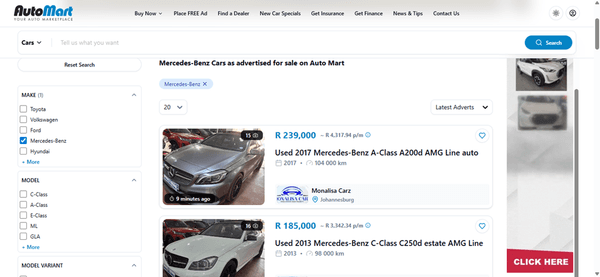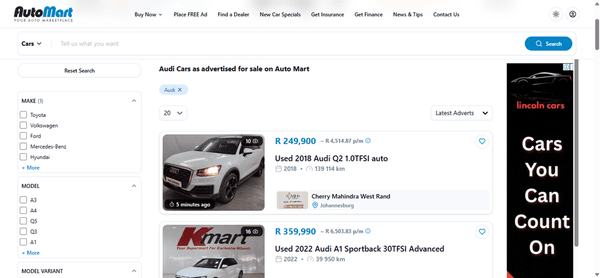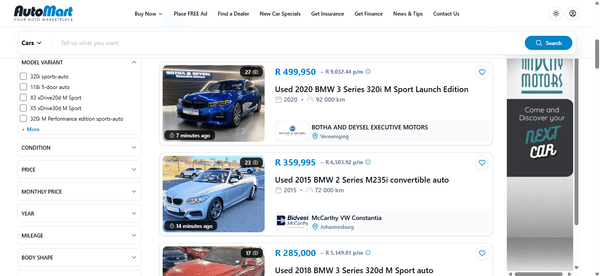As a middle-class South African, can you comfortably afford the cheapest Audi, BMW, and Mercedes-Benz? The allure of the luxury and prestige surrounding these brands has long captivated car enthusiasts, yet a persistent question remains: Can the middle class truly afford the cheapest offerings from these iconic German automakers in South Africa? Let’s take a look at the realities of accessibility and affordability for those dreaming of owning an entry-level Audi, BMW, or Mercedes-Benz. If you’ve been trying in vain to find a specific model of a car, set up an Auto Mart alert and receive a notification when one becomes available.
Before we embark on this exploration, it’s crucial to understand the allure of these luxury vehicles.

Let’s Explore These Luxurious Brands
When we think of Audi, BMW, and Merc, images of sleek designs, cutting-edge technology, and unparalleled performance often come to mind. These brands have long been synonymous with luxury and status, catering primarily to the affluent segment of society. However, in recent years, they’ve also ventured into producing more affordable models, aiming to attract a wider range of customers, including the middle class. Bear in mind that the affordability of vehicles can vary greatly depending on individual financial circumstances, including income, expenses, and savings. However, here are some general price ranges for the cheapest models of Audi, BMW, and Merc available in South Africa:
- Audi A1: The Audi A1 is one of Audi's more affordable models. Prices on Auto Mart range from around R69 900 to R289 000 for the base model.
- BMW 1 Series: BMW's entry-level model, the 1 Series, is priced competitively. Prices on Auto Mart typically start at around R39 900 and can go up to R500 000 for the base model.
- Mercedes-Benz A-Class: Mercedes-Benz's A-Class is known for its compact luxury. Prices on Auto Mart generally start at around R15 900 and can go up to R699 900 for the base model.
Whether these prices are comfortably affordable for a middle-class South African would depend on various factors, including their income, expenses, savings, and financial priorities. Some middle-class individuals may find these prices manageable with financing options or careful budgeting, while others may consider them too expensive. It's essential for individuals to assess their own financial situations and priorities before making such a significant purchase.

Let’s start by examining the cheapest Audi available.
The Audi A1, with its compact size and sporty demeanour, represents the entry point into the Audi lineup. Priced competitively compared to its larger siblings, the A1 offers a taste of luxury without breaking the bank. With its stylish exterior, well-appointed interior, and efficient engine, it’s a tempting choice for those looking to step into the world of Audi ownership.
Now, moving on to BMW.
The 1 Series stands out as the most affordable option in the Bavarian automaker’s portfolio. With its dynamic driving experience, premium amenities, and unmistakable BMW styling, the 1 Series embodies the brand’s ethos in a more compact package. While it may not offer the same level of opulence as its larger counterparts, it still delivers a premium driving experience that’s sure to satisfy enthusiasts on a budget.
Finally, we come to Mercedes-Benz and its entry-level offering, the A-Class. Boasting a modern design, advanced technology features, and a range of efficient engines, the A-Class is a compelling choice for those drawn to the allure of the three-pointed star. Despite being the Mercedes-Benz model available, it doesn’t compromise on luxury or refinement, making it a worthy contender in the compact luxury segment.
With all the exploration of the cheapest Audi, BMW, and Mercedes-Benz done, let’s now address the elephant in the room: affordability.
Cheapest Audi, BMW, and Mercedes-Benz: Affordability Challenges
While these entry-level models from the above-mentioned brands may be more accessible than their higher-end counterparts, they’re still a significant financial commitment for the average middle-class consumer in South Africa. With the different cheapest Audi, BMW, and Mercedes-Benz prices available, purchasing one of these vehicles requires careful financial planning and consideration.
Factors such as monthly instalments, insurance premiums, fuel costs, and maintenance expenses all contribute to the overall affordability equation. While financing options and promotional deals may make ownership more feasible in the short term, it’s essential for prospective buyers to assess the long-term implications of their purchase decision.
Additionally, it’s crucial to recognise that owning a luxury vehicle extends beyond the initial purchase price. Maintenance and servicing costs for premium brands like Audi, BMW, and Merc tend to be higher than those for mainstream brands, further impacting the total cost of ownership. As such, prospective buyers should factor these ongoing expenses into their budgetary calculations.
Despite the financial considerations involved, owning a luxury car like an Audi, BMW, or Mercedes-Benz can be a rewarding experience for those who prioritise style, performance, and prestige. These brands have built a reputation for excellence over decades, and even their entry-level models embody the essence of luxury motoring.

FAQs
1. Are the entry-level models of these cars as luxurious as their higher-end counterparts?
A: While the entry-level models do offer luxury features and designs, they may not have the same level of extravagance as the higher-end models. Nevertheless, they still embody the essence of their respective brands.
2. What makes the Audi A1, BMW 1 Series, and Mercedes-Benz A-Class affordable?
A: These models are priced more competitively compared to their higher-end siblings due to a combination of factors, including simpler specifications, smaller engine options, and fewer premium optional extras.
3. Can the middle class opt for used luxury cars instead?
A: Yes, purchasing a used luxury car can be a more affordable option for the middle class. However, it is important to consider the condition, maintenance history, and potential repairs associated with pre-owned vehicles.
4. Is it possible to finance the purchase of an entry-level Audi, BMW, or Mercedes-Benz?
A: Yes, most dealerships offer financing options that enable buyers to spread the cost of the car over a period of time. However, it is essential to consider the interest rates and additional fees associated with financing.
5. Are there any tax implications when owning a luxury car in South Africa?
A: Yes, luxury cars are subject to higher taxes and levies in South Africa. Prospective buyers should be aware of these additional costs when considering the purchase of a luxury vehicle.
The dream of owning an Audi, BMW, or Mercedes-Benz is within reach for many middle-class consumers in South Africa thanks to the availability of more affordable entry-level models. However, affordability remains a subjective concept, influenced by individual financial circumstances and priorities. While these vehicles may represent a significant investment, their allure and prestige continue to attract buyers seeking a taste of the high life on the open road. So, can the middle class afford the cheapest Audi, BMW, and Mercedes-Benz in South Africa? With careful planning and consideration, the answer is a resounding yes. Create an alert to get informed when a specific car model that you have been looking for on Auto Mart becomes available.
Read Related Articles
- Buying a Used Audi in South Africa: Things to Know Before Buying
- Why Audi Cars Are Women Favorite: A Closer Look at Their Appeal
- BMW Brand Overview: Tips for Buying BMW Cars for Sale
- BMW ConnectedDrive Services & Apps: Enhancing Your Driving Experience
- Discover the Most Expensive BMW Model in South Africa
- Why the Mercedes-Benz E-Class for Sale is the Ultimate Luxury Sedan






